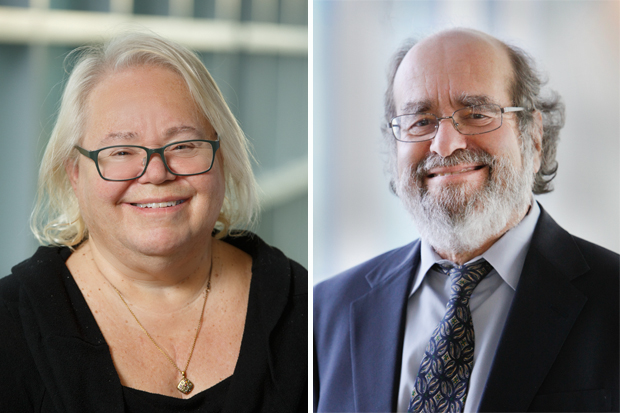Eve Marder and Irv Epstein recall the collaborations that started it all
The University Professors will lead a public symposium on Nov. 17
 Photo/Mike Lovett
Photo/Mike LovettUniversity professors Eve Marder '69, Left, and Irving R. Epstein
University Professors Eve Marder '69 and Irv Epstein will help celebrate the 25th anniversary of the Volen National Center for Complex Systems in a public symposium November 17.
Marder, the Victor and Gwendolyn Beinfield Professor of Neuroscience, and Epstein, the Henry F. Fischbach Professor of Chemistry, were named University Professors last spring in recognition of their pioneering interdisciplinary achievements. At the symposium, they will each deliver a lecture drawing on their collaborative research on oscillators. In the case of Epstein, these are oscillating chemical reactions. In Marder’s case, it is rhythmically active neurons and/or circuits.
But some 35 years ago, before they were leaders in their fields, Epstein and Marder saw the benefit of sharing ideas. A mutual colleague noticed that the chemical reactions recorded on the chart recorder Epstein was using looked intriguingly similar to the neuronal signals Marder was recording in her research.
“It’s relatively unusual behavior for chemistry, but it’s sort of the essence of what goes on in neuronal systems,” said Epstein, who soon learned some rudiments of neuroscience from Marder and began mathematically modeling groups of neurons. For her part, Marder “got an appreciation for what interacting with theorists could bring, to help her answer the kind of questions she wanted to answer,” said Epstein.
These days, Marder’s research on small neural circuits found in lobsters and crabs is credited with revolutionizing understanding of the fundamental nature of neuronal circuit operation, including how neuromodulators control behavioral outputs and how the stability of circuits is maintained over time. She has won many top prizes in neuroscience, including the Gruber Award in Neuroscience, the Kavli Prize in Neuroscience, and the National Academy of Sciences Neuroscience Prize. In March, she will receive the Carnegie Prize in Mind and Brain Science from Carnegie Mellon University.
Epstein, a Howard Hughes Medical Institute professor, pioneered the field of chemical oscillators. “When we got into the field of oscillating reactions, there were just three that were known, and they were all discovered accidentally,” said Epstein. “We decided that if we really understood these systems, we should be able to design them.”
Although it took him several years and three unsuccessful grant applications to secure funding for his ideas, Epstein and his lab ultimately won funding, and within a few months succeeded in developing their first novel chemical oscillating reaction.
Writ large, Marder and Epstein collaboratively demonstrate that the kinds of phenomena seen in neurons are also found in chemical and physical systems. “What you learn from modeling chemical reactions can help you understand how neurons work, and vice versa,” said Epstein.
“Volen is a place where you get all kinds of collaborations,” said Marder. “One of Brandeis’ strengths is its interactivity; those early days were quite catalytic.”
Categories: Research, Science and Technology





